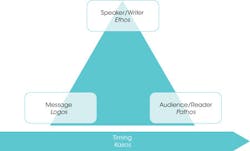Chasing the fat raise
A rhetorical analysis of negotiating for a salary increase
BY Heidi Emmerling Muñoz, PhD
Here's an easy quiz for you>>>Choose the most effective way of obtaining a raise:
A. Your schedule shows three cancellations, and the office's production is the lowest it has been for the past year. During the cancellations, you catch up on emails and phone calls. The dentist just returned from a funeral, so you tell the dental assistant, not the dentist, that you need a raise because the baby needs food, your spouse got laid off, and the rent on your apartment is increasing. You tell her an engaging story of how your baby is a miracle baby and that your spouse has decided to pursue a career in music despite that his only experience has been at the karaoke bar.
B. Although you have a few cancellations at the beginning of the day, you fill them by making phone calls or asking patients who are in the office and due for their maintenance visit if they would like to stay and have it done that day. You remind the patients in your schedule of work that needs to be done and offer to get them in the doctor's schedule immediately. The dentist just celebrated her 10th wedding anniversary. The doctor also just announced a fee increase. You make an appointment with the dentist (or whoever is in charge of granting salary increases) to discuss a performance review/preview. During that meeting, you inform the dentist of your production numbers since your last salary increase, percentage of salvaged schedules, and patients who, at your reminding them, scheduled and completed treatment. You present a logical and plausible plan of how you can make your numbers even better.
From all you know intuitively about asking for a raise-and Googling the bazillion articles already published on how to get a raise-you hopefully chose B. It's all about using sound rhetorical strategies from understanding the triad, to implementing rhetorical appeals, to being clear on the purpose of your communication. These rhetorical strategies have been around since the ancient philosophers. Doing a rhetorical analysis on salary negotiations (with particular attention paid to the triad, appeals, and purposes) will allow you to be deliberate, mindful, and successful with your interpersonal communication and, hopefully, land you that fat raise you have been hoping for.
What about rhetoric? Is it a dirty word? Many have heard the phrase, "That's empty rhetoric" or "That's a rhetorical question," somehow implying that rhetoric is empty flim-flam used by unsavory politicians trying to "pull one over" on you, or sneaky salespeople attempting to separate you from your hard-earned cash.
To be a successful negotiator, whether it be for a well-deserved raise or for adequate time in the schedule to provide optimal patient care, understanding the basics of rhetoric is essential. The first thing to understand is that rhetoric is using certain tools to communicate effectively, ultimately influencing the thought and conduct of an audience. Rhetoric is an art and an expansive field of academic study. Case in point: my PhD is in composition and rhetoric. Like almost anything else, rhetoric can be used for good or misused for not-so-good.
Figure 1: Rhetorical Triangle
First, classical rhetoricians have used the term "rhetorical triangle" to represent the items involved in all communications. At one point of the triangle is the speaker or writer (you, if you are the one negotiating for a raise). The second point in the triangle is the audience (the dentist or the person who has the power to grant the raise). The third point in the triangle is the message itself (the conversation about a raise). Knowing this is important in negotiating a raise because each point on the triangle impacts and influences the others. You need to understand the dentist's position and needs as well as the proper person to whom to address your message. For example, it would be misguided to discuss your need for a raise with the assistant-unless of course the assistant is the one who has the ability to give you the raise. The dentist's temperament and situation impacts how you craft your message, and the message itself will impact the dentist and you. See figure 1, Rhetorical Triangle.
Related to and overlaying the triad are the rhetorical appeals: ethos, logos, pathos, and kairos. Ethos is the ethical appeal or appeal to credibility. On the rhetorical triangle, ethos is the speaker, or in this case, the one asking for a raise, you. How have you established your credibility? If you have established a pattern of being honest, dependable, and good at what you do, you bring that to the conversation, and that is what the audience/listener/dentist is going to expect. If you have not established characteristics meriting a salary increase, you will need to provide a plan of how you will.
Some tangible strategies of establishing ethos/trustworthiness include doing good by your employer, patients, and colleagues; being knowledgeable about your points (your numbers); and making and keeping your appointment to talk with the dentist. During the conversation, continue to cite events that are consistent with your numbers and your message. Use the STAR method when presenting your numbers. Make sure your numbers are sufficient, typical (don't "cherry pick" just the good days), accurate, and relevant. Failure to do so will undermine your ethos.
Next is pathos, which is related to your audience, or in the case of this salary negotiation, the dentist. Pathos is the emotional appeal. What does your audience care about? To use this, have empathy and find common ground. While talking about how your baby needs food might on the surface look like an emotional appeal, unless the dentist is part of your family, it is unlikely it will have the impact you hope for. Hearing about how you can help meet the employer's needs is much more persuasive to your employer than hard-luck soap operas. Look at the practice's mission statement to get ideas about how to communicate. A family practice? How are you going to better meet the children's needs? A perio practice? How can you do more perio? Does the employer pride herself on lack of staff turnover? Mention how long you intend to stay.
Another way to use pathos to your advantage is mirroring the dentist's language, phrases, rate of speech, mannerisms, and so forth to show commonality. Use eye contact, and eliminate physical boundaries and competing noise. Use analogies, metaphors, and sensory language that connect with the dentist. Tell relevant stories. If it comes naturally to you both, use gentle humor as a way to build bridges, being very careful to avoid emotional landmines. For example, you would want to avoid mother-in-law jokes if your employer just returned from the mother-in-law's funeral. Evoking planned curiosity and surprise (versus unplanned confusion) has been known to be effective. Maybe the dentist is unaware of your numbers or nonboasted activities you do that help the practice.
Pathos can be tricky though. Used inappropriately, it sounds contrived and manipulative, and no one likes to feel manipulated. Remember, your purpose is to connect, not bamboozle. You are not a puppeteer pulling on heartstrings, but rather you should be authentic and honest about your ideas and share that authenticity.
15 raise requests that can backfire
1. False cause: Claiming something happened as a result of something else. I ate cake for breakfast. It rained. If you eat cake for breakfast, it will rain. When negotiating for a raise, be careful and able to back up that your numbers are the result of your work (and, if necessary, your numbers are not a result of your work).
2. (Inappropriate/illogical) appeal to emotion: I need a raise because my baby is starving, my spouse got laid off, and my dog is going blind. Plus I deserve it. I worked hard in school.
3. Slippery slope: If A, then Z. If I don't get a raise, I will be so poor that I will need to live under a bridge.
4. Ad hominem: Attacking the person without listening to their side. You are denying my request for a raise because you are a cheap SOB.
5. Red herring: Shifting the focus off the issue at hand. You think I could do more to help out when I have a cancellation? Danielle left early last week.
6. Personal incredulity: If you don't understand something, acting as though it is untrue. Do you honestly want me to believe all this mumbo jumbo of percentages and taxes
7. Loaded question: Attempt to sidestep the issue at hand by putting the audience on the defensive. You can't afford to give me a raise? Is it because your last hygienist is suing you for sexual harassment
8. Burden of proof: If something cannot be proven wrong, it must be true. If I get a raise, I will never need new instruments again.
9. Ambiguity: Using a double meaning to misrepresent the truth. What do you mean that I didn't try to help out more? I have tried, and it didn't work.
10. Gambler's fallacy: Events happen in runs. People have been cancelling their appointments all month. Things are bound to turn around this month.
11. Bandwagon: Other people are doing it, so you should too. Four of my hygienist friends, all from different offices, are getting raises. I should too.
12. Appeal to false authority: Oprah gives away cars, so you should too.
13. Composition/Division: Part of something should be applied to all. You live well (your Rolls Royce and Rolex are prominently displayed), so we all should too.
14. Black or white reasoning (false dilemma): Giving an ultimatum. Give me a raise, or I quit. Those are your two choices.
15. Circular reasoning: Failure to give me a raise is unfair because it would be unethical not to.
Logos is the appeal to logic, which is essential when speaking to a "show me" type of audience. Whenever you are asking for money, your audience will want proof. Logos is related to how your message is constructed. Make sure your proposal for a raise is carefully structured and organized. Think of your proposal as an essay with a beginning (stating the issue and convincing the dentist that there is an issue-the merits of your raise), a middle (the solution, giving you the raise), and an end (how and why your ideas to implement the raise are solid).
Discuss standard practice of salary versus production. Depending on which consultant you refer to, your salary should range from 30 to 50% of your production. If you are below that, present the evidence and cite the expert to which your dentist espouses. If your salary is over 50% of your production, show how you will increase production. Although these are not hard-and-fast, black-and-white numbers, logos can also address soft skills that are not always reflected in the production numbers. How do you get along with the rest of the staff? Do you refer patients, write the office newsletter, confirm patients, file charts, administer anesthesia, or take impressions for the dentist?
This is a two-way street. Have a Plan B with your logos. When negotiating, keep in mind that compensation, just as soft skills, does not always have a calculable number. If the dentist is not prepared to increase your salary, maybe you could negotiate for a more flexible schedule, the room with a view, the good parking spot, more days off, CE, an assistant, and so forth. But remember, the text of your message, the logos, must be carefully planned and structured. Just throwing numbers around without context or analysis will not be helpful to either of you.
Remember with logos to avoid common logical fallacies. Deceptively persuasive, these are frequently used in commercials and political speeches. The sidebar to this article offers a few dramatic examples to give you an idea; most are much more subtle.
In addition to the rhetorical appeals is kairos, which refers to choosing the opportune time and crafting the right moment. Obviously, trying to negotiate for a raise when you are wiping down your room and the dentist is 20 minutes behind schedule is inappropriate as is springing the idea on the employer with no notice while you are both distracted. More poor choices of kairos are after you have had a thin schedule, a particularly lean month in your production numbers, or a spat with the receptionist. It is obviously preferable to set aside a dedicated, uninterrupted time when you both can focus, free of outside distraction. Ideally, you want your audience confident and prepared for the meeting, not caught off guard. Additionally, your chances for success increase when the dentist has recently observed solid production numbers, extraordinarily positive patient feedback, efforts to make your colleagues' lives easier, and so forth.
None of these appeals works in isolation. Having chosen the right time will not compensate for lack of logos or untrustworthiness. Conversely, being a model employee will not make your negotiation especially successful if you spring it on your boss right after she had a squabble with her spouse. Even though you might have a ton in common with your employer-you run together after work and have the same taste in music-do not expect a raise without asking her directly or being prepared with your number. Chances for success increase when all the appeals are used in concert with one another.
In addition to understanding the triad and the appeals, be mindful of the various purposes of rhetoric: to inform, to please, and to persuade. Communication rarely has only one purpose. However, there is usually one prominent purpose. When negotiating a raise, the primary purpose is to persuade. To be persuasive, one must use the appeals appropriately. However, there are the secondary purposes of informing and to a very minor extent entertaining or pleasing. Informing the employer about the numbers will help with the persuasiveness as will minimal entertaining small talk and gentle humor. The problem occurs when the negotiator forgets the purpose and relies solely on throwing numbers at the employer, leaving it up to the employer to connect the dots with no persuasion. An equally weak tactic would be coming to the meeting prepared with lots of stories, jokes, pictures of your children and dog, or maybe a super sad story about how your spouse took your dog and ran off into the sunset with your single neighbor with no numbers or persuasive (audience-centered) reasons for the raise and expecting the employer to simply offer you the raise without asking for it.
From knowing your purpose, employing all of the appeals, and understanding the dynamics of the rhetorical triad, you will be prepared to successfully negotiate that well-deserved raise-or any other proposal for that matter. A very wise rhetorician once said, "The matter is as it is in all other cases: if it is naturally in you to be a good orator, a notable orator you will be when you have acquired knowledge and practice..." (Plato, Phaedrus). RDH
HEIDI EMMERLING MUÑOZ, PhD, is a professor of English at Cosumnes River College. Prior to her current position, Dr. Muñoz was interim director and professor of dental hygiene at Sacramento City College. She has written numerous articles and columns and is a frequent contributor to RDH. Dr. Muñoz can be reached at [email protected].


